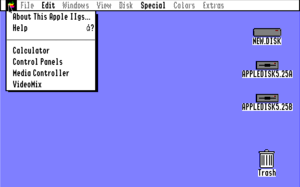This article needs additional citations for verification. (May 2023) |
GS/OS is an operating system developed by Apple Computer for its Apple IIGS personal computer. It provides facilities for accessing the file system, controlling input/output devices, loading and running program files, and a system allowing programs to handle interrupts and signals. It uses ProDOS as its primary filing system. GS/OS is a component of Apple IIGS System Software versions 4.0 through 6.0.1, and was the first true 16-bit operating system for the IIGS.
 The IIGS Finder running within GS/OS | |
| Developer | Apple Computer |
|---|---|
| OS family | GS/OS |
| Working state | Historic |
| Source model | Closed source |
| Initial release | 1988 |
| Latest release | GS/OS v4.02 (System Software 6.0.1) / May 6, 1993 |
| Kernel type | Monolithic kernel |
| License | Apple Software License Agreement |
Features edit
Speed optimization edit
The advantage of GS/OS over its predecessor, the ProDOS 16 operating system, is that it was written entirely in 16-bit code for the 65816 processor used in the IIGS, rather than primarily in 8-bit 6502 machine code that does not take advantage of the IIGS's unique features. This in turn allows GS/OS to offer vast speed optimizations (loading time, disk access, screen updates) compared with the previous OS, and provided room to incorporate many features of other Apple operating systems, including Apple III Apple SOS, the Macintosh System 5, as well as concepts and features that would later appear in future Macintosh System Software releases (e.g. proportional scrollbars, thermometer progress bars).
New features and enhancements edit
In addition to continued enhancements to the IIGS Finder and loadable fonts, GS/OS offered plug-in device drivers (modem, printer, etc.), a thermometer progress display, AppleShare support, File System Translators for accessing foreign file formats, disk caching and support for storage devices up to 4 Gigabytes.[1] It also extends the ProDOS file system to provide for resource forks on files similar to those used on the Apple Macintosh, which allows for programs to be written in a more flexible way. The newly included Apple Advanced Disk Utilities and Apple IIGS Installer helped facilitate partitioning, formatting and installing software and drivers with visual ease. A command-line development environment called APW (Apple Programmer's Workshop) is available; much like the Macintosh Programmer's Workshop.[2][3][4]
File System Translators edit
GS/OS includes a facility known as file system translators (FSTs) which allows it to support multiple on-disk file systems in a manner transparent to application programs and to the user, a feature not found in ProDOS or most other microcomputer operating systems at the time. While GS/OS natively uses the ProDOS file system (from which it must be booted), it also fully supports HFS used by Mac OS. Other file system translators include those for MS-DOS, High Sierra/ISO-9660, Apple DOS 3.3, and Pascal, albeit read-only (full read/write support had been planned but was never completed).
Releases edit
Source:[5]
ProDOS 16 (GS/OS predecessor) edit
- 1986 – System 1.0 (ProDOS 16 v1.0), System 1.1 (ProDOS 16 v1.1)
- 1987 – System 2.0 (ProDOS 16 v1.2), System 3.1 (ProDOS 16 v1.3)
- 1988 – System 3.2 (ProDOS 16 v1.6)
GS/OS edit
- 1988 – System 4.0 (GS/OS v2.0)
- 1989 – System 5.0 (GS/OS v3.0), System 5.0.1 (GS/OS v3.0), System 5.0.2 (GS/OS v3.0)
- 1990 – System 5.0.3 (GS/OS v3.03)
- 1991 – System 5.0.4 (GS/OS v3.03)
- 1992 – System 6.0 (GS/OS v4.01)
- 1993 – System 6.0.1 (GS/OS v4.02)
Unofficial versions edit
See also edit
- Apple DOS
- Apple II
- Apple IIGS
- Juiced.GS – The last remaining Apple II publication
- KansasFest – An annual convention for Apple II users
- Macintosh Finder
- ProDOS
References edit
- ^ Arnett, Nick (1988-09-19). "Apple Unveils IIGS OS, Speedier Apple IIc Model". InfoWorld. Vol. 10, no. 38. IDG. p. 39. ISSN 0199-6649. Retrieved 2016-08-03.
...Apple Computer last week introduced a new operating system for the Apple IIGS,.....The new GS/OS operating system for the Apple IIGS has an enhanced, more Mac-like Finder and speeds up booting......includes support for large storage devices, up to 4 gigabytes...GS/OS runs programs written for the earlier operating systems, Pro-Dos 16 and Pro-Dos 8...
- ^ "Apple IIGS Programmer's Workshop - Version 1.0 (K2S002)" (PDF). goldstarsoftware.com. Retrieved 2016-08-03.
...APW C is intended for use with the Apple Programmer's Workshop...
- ^ "Morgue, Cortland Programmer's Workshop". byteworks.us. Archived from the original on 2016-08-19. Retrieved 2016-08-03.
...Apple decided to use a 16 bit version of ORCA/M as the standard development environment for the new machine, code named Cortland. On July 21, 1986, the last version of this environment that was still called Cortland Programmer's Workshop was delivered to Apple for shipment to the developer community. Later versions were called Apple Programmer's Workshop, or just APW...
- ^ Westerfield, Mike (2013). "About the Author". Building IPhone and IPad Electronic Projects: Real-World Arduino, Sensor, and Bluetooth Low Energy Apps in TechBASIC. Beijing: O'Reilly Media. p. 317. ISBN 978-1449363482. Retrieved 2016-08-03.
...Mike Westerfield...Two years later he finished ORCA/M, which went on to become Apple Programmer's Workshop, the Apple development environment for the Apple IIGS...
- ^ "GUIdebook > ... > Apple II > GS/OS". guidebookgallery.org. Retrieved 2016-08-03.
- ^ "Announcing Apple IIgs System 6.0.2". callapple.org. 2015-07-12. Retrieved 2016-08-03.
- ^ "The Source Awakens .. System 6.0.3, a New Release". a2central.com. 2015-08-03. Retrieved 2016-08-03.
- ^ "The Source Is Strong With This One – System 6.0.4". a2central.com. Retrieved 2017-01-04.
External links edit
- Apple IIgs GS/OS 6.0.1 Screenshots and details
- GS/OS at the Apple II History Museum
- A2Central.com Archived 2009-06-26 at the Wayback Machine – Apple II news and downloads